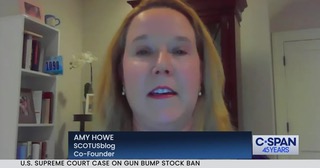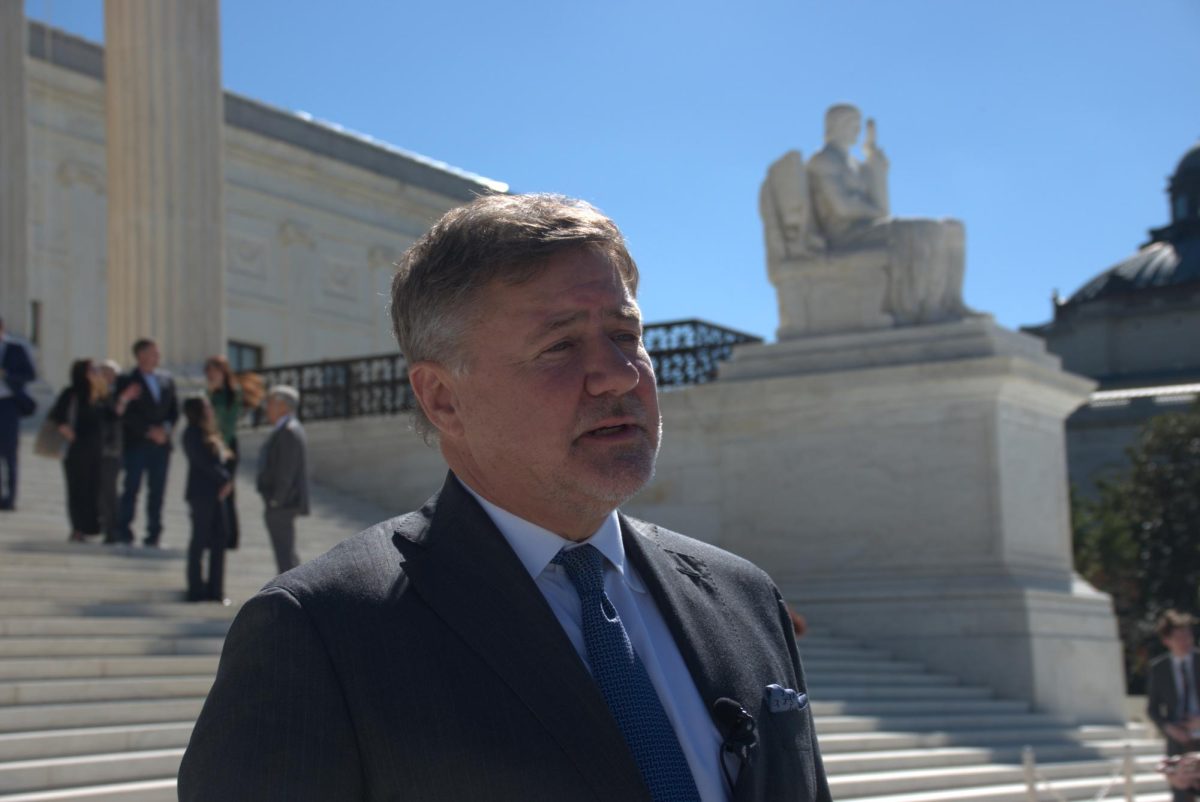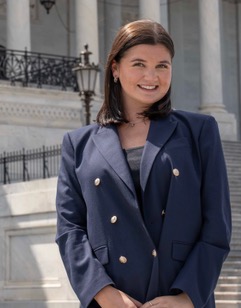BOSTON – High-impact rulings and emergency docket decisions by the U.S. Supreme Court are shaping state policy more widely than ever before, a legal analyst told a packed ballroom here of state legislators.
Amy Howe, cofounder of the Washington-based Supreme Court tracker SCOTUSblog, said in a special session hosted by the National Conference of State Legislatures that recent decisions covering issues from gender-affirming care to free speech are almost certain to drive changes across the country.
“When I look back and think about this term I think about the emergency docket. The court was extremely active on the emergency docket this term and in particular the Trump Administration was very active on the emergency docket,” Howe said.
Between January 20 and June 30 the Trump administration filed 113 emergency docket applications, more than twice as many requests for emergency relief than the George W. Bush and Obama administrations filed in 16 years.
“It was really a separate order of magnitude from what it had been in the past,” Howe said.
Even the rulings had more far reaching effects.
In one case from Oklahoma, the court ruled that the prosecution’s failure to correct false testimony is grounds for a new trial. In another case from Maryland, the court held that parents must be given notice before schools require elementary students to participate in lessons on gender and sexuality that conflict with their religious beliefs. In a third case from South Carolina, the court ruled that Medicaid recipients cannot challenge which providers a state contracts with, allowing the state to cancel coverage for Planned Parenthood.
In Glossip v. Oklahoma, the Court held that the prosecution’s failure to correct false testimony violated the Due Process Clause and sent the case back for a new trial. The central question was whether Oklahoma could proceed with Richard Glossip’s execution despite acknowledged prosecutorial misconduct and other errors that may have infringed his rights.
Howe noted that following the ruling, Attorney General Gentner Drummond is now pursuing a non-capital first-degree murder conviction in Oklahoma County. This reverses a 2023 email agreement between Glossip’s attorney, Don Knight, and Drummond, recently brought to light by Knight, which would have allowed Glossip to accept a time-served plea on an accessory to murder charge.
On July 16, Drummond rejected Glossip’s proposed plea bargain, signaling a significant new legal turn in the long-running case.
But Glossip is not the only ruling with ripple effects in Oklahoma. Howe highlighted other key decisions that either reaffirmed or reshaped the state’s legal landscape.
In Mahmoud v. Taylor the court examined whether a Maryland school district violated parents’ First Amendment rights by requiring elementary students to participate in lessons on gender and sexuality that conflict with their religious beliefs without giving parents notice or opt-out options.
The case was sent back to the lower courts with the Court concluding that government policies infringe on parents’ First Amendment free exercise rights when they interfere with the religious upbringing of their children.
This ruling resonates in Oklahoma, where similar legislative proposals were introduced earlier this year. Senate Bill 759 would have required written parental consent for any sexual education instruction and advance notice for lessons involving sexual orientation or gender identity. House Bill 1964 would have extended similar notification and consent requirements to topics on diversity, equity, inclusion, gender or sexuality.
Both measures ultimately died in committee, but the outcome of Mahmoud v. Taylor could influence future efforts to reintroduce similar legislation.
Another case that quickly landed in Oklahoma arose after a South Carolina Medicaid recipient (Medina v. Planned Parenthood) was disqualified from receiving medical services such as contraception, cancer screenings and STI treatments following an executive order from the state’s governor. That order directed the Department of Health and Human Services to remove abortion providers from the state’s Medicaid program.
The Court ultimately held that the Medicaid Act does not unambiguously confer an enforceable individual right, and therefore private plaintiffs cannot challenge a state’s exclusion of Planned Parenthood from Medicaid coverage.
Within days of that decision, Governor Kevin Stitt issued an executive order on July 31 directing the Oklahoma Health Care Authority to terminate SoonerCare contracts with any providers that “perform, refer to, or are affiliated with abortion services.” The order also prohibits state agencies from awarding public funds to such providers.
“Oklahoma is a pro-life state, and our policies should reflect that at every level of our government,” said Stitt. “We won’t allow tax dollars to indirectly subsidize and flow into the abortion industry under the guise of women’s health. My order makes sure every public dollar aligns with our values and supports providers who respect life at every stage.”
Howe also pointed to United States v. Skrmetti, a case challenging a Tennessee law that restricted certain medical treatments for transgender minors, that will make waves in coming years. Groups of transgender minors, their parents and healthcare providers argued that the law violated the Equal Protection Clause of the Fourteenth Amendment. The Court ultimately ruled that such laws do not violate the Equal Protection Clause.
It didn’t take long for that case to come back to Oklahoma. On Wednesday, the U.S. 10th Circuit Court of Appeals upheld the Tulsa federal district court’s denial of a preliminary injunction in Poe et al. v. Drummond et al. This case was brought by Lambda Legal, the American Civil Liberties Union, the ACLU of Oklahoma, the law firm Jenner & Block, five families of transgender adolescents and Dr. Shauna Lawlis of OU Health.
They challenged Oklahoma’s Senate Bill 613, which prohibits medical providers from performing “gender transition procedures” on anyone under 18.
The Tenth Circuit denied the appeal Wednesday in a decision citing Skrmetti in finding that the law does not unlawfully discriminate.
“SB 613 prohibits gender transition procedures for any person under the age of eighteen. If the law truly sought to discriminate against transgender persons, the prohibition would not distinguish based on age. Instead, the purpose becomes clear: children’s welfare,” the decision stated.
Attorney General Genter Drummond, stated that this is protection for Oklahoman children from “so-called ‘gender transition’ procedures.”
“My office mounted a vigorous defense of this commonsense law to protect children, and I am grateful the battle is now won,” Drummond said in a press release. “Thanks to this critical victory, our children will no longer be subjected to the lifelong consequences of these damaging procedures.”
Lambda Legal, American Civil Liberties Union and the ACLU of Oklahoma stated that the ban puts “political dogma above parents, their children, and their family doctors.”
“Today’s ruling is a devastating outcome for transgender youth and their families across Oklahoma and another tragic result of the Supreme Court’s errant and harmful ruling in Skrmetti,” the plaintiffs said in a press release. “Oklahoma’s ban is openly discriminatory and provably harmful to the transgender youth of this state, putting political dogma above parents, their children, and their family doctors.”
State Senate Majority Leader Julie Daniels (R-Bartlesville) said that she was grateful that the court acknowledged that her bill was not motivated by discrimination, but by the “state’s interest in safeguarding the long-term health and well-being of all children in our state.”
“This law protects children from making life-changing, medical decisions until they reach some level of maturity and can better understand the risks to their long-term health,” Daniels said in a press release. “The mental health challenges of gender dysphoria are very real. These young people and their families deserve to have attention focused on behavioral and mental health care, not rushing them into making adult decisions as a child.”
Gaylord News is a reporting project of the University of Oklahoma Gaylord College of Journalism and Mass Communication. For more stories by Gaylord News go to



